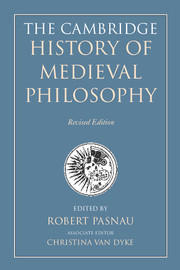Book contents
- Frontmatter
- Contents of Volume 1
- Preface
- List of contributors
- Frontmatter
- Contents of Volume 2
- Introduction
- I Fundamentals
- II Logic and language
- III Natural philosophy
- IV Soul and knowledge
- V Will and desire
- VI Ethics
- VII Political philosophy
- VIII Metaphysics
- 44 The subject of the aristotelian science of metaphysics
- 45 Essence and existence
- 46 Form and matter
- 47 Realism
- 48 Nominalism in the later middle ages∗
- 49 Accidents and modes
- IX Theology
- Appendices
- Bibliography of primary sources
- Bibliography of secondary sources
- Index nominum
- Index rerum
- References
48 - Nominalism in the later middle ages∗
from VIII - Metaphysics
Published online by Cambridge University Press: 05 August 2014
- Frontmatter
- Contents of Volume 1
- Preface
- List of contributors
- Frontmatter
- Contents of Volume 2
- Introduction
- I Fundamentals
- II Logic and language
- III Natural philosophy
- IV Soul and knowledge
- V Will and desire
- VI Ethics
- VII Political philosophy
- VIII Metaphysics
- 44 The subject of the aristotelian science of metaphysics
- 45 Essence and existence
- 46 Form and matter
- 47 Realism
- 48 Nominalism in the later middle ages∗
- 49 Accidents and modes
- IX Theology
- Appendices
- Bibliography of primary sources
- Bibliography of secondary sources
- Index nominum
- Index rerum
- References
Summary
There is no dispute that nominalism is a major movement in logic and philosophy during the later Middle Ages. Not only are some major thinkers connected with it, such as William of Ockham and John Buridan, but it is the place where some decisive innovations fully unfold, such as the theory of mental language and of the universal as sign. Even so, the term ‘nominalism’ seems uncertain and equivocal, for several reasons.
First, it is commonly admitted that there are two great periods of medieval nominalism: the twelfth century and the fourteenth century. The historical and theoretical links between the two are, however, far from clear. The questions that constitute the conceptual core of the confrontations between schools in the dialectic of the twelfth century – such as the question of the unity of names, the nature of inference, and the reality of relations within the Trinity – are not found in the same terms two centuries later; as for universals, although Abaelard criticizes the theory of real universals, he posits a status which, without being a thing, must account for the imposition of universal names, and for which no equivalent is found in the fourteenth century. The rapprochement of the two periods, the exaggerated place accorded to the problem of universals, and the major role attributed to Abaelard are due to a historiography that began in France in the nineteenth century with Victor Cousin, but that current knowledge renders more and more problematic.
- Type
- Chapter
- Information
- The Cambridge History of Medieval Philosophy , pp. 661 - 673Publisher: Cambridge University PressPrint publication year: 2014
References
- 1
- Cited by



